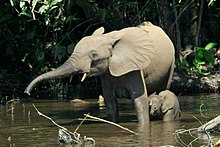
Back Afrika-olifant Afrikaans فيل إفريقي Arabic فيل افريقى ARZ Fuzol (Loxodonta) AVK Afrika fili Azerbaijani Африкански слонове Bulgarian আফ্রিকান হাতি Bengali/Bangla Loxodonta Breton Afrički slon BS Elefant africà Catalan
| African elephants | |
|---|---|

| |
| African bush elephant bull in Kruger National Park | |

| |
| African forest elephant in Nouabalé-Ndoki National Park | |
| Scientific classification | |
| Domain: | Eukaryota |
| Kingdom: | Animalia |
| Phylum: | Chordata |
| Class: | Mammalia |
| Order: | Proboscidea |
| Family: | Elephantidae |
| Tribe: | Loxodontini |
| Genus: | Loxodonta Anonymous, 1827[1] |
| Type species | |
| Elephas africana[1] Blumenbach, 1797
| |
| Species and Subspecies | |
| |

| |
range of living Loxodonta (2007)
| |
African elephants are members of the genus Loxodonta comprising two living elephant species, the African bush elephant (L. africana) and the smaller African forest elephant (L. cyclotis). Both are social herbivores with grey skin. However, they differ in the size and colour of their tusks as well as the shape and size of their ears and skulls.
Both species are at a pertinent risk of extinction according to the IUCN Red List; as of 2021, the bush elephant is considered endangered while the forest elephant is considered critically endangered. They are threatened by habitat loss and fragmentation, along with poaching for the illegal ivory trade in several range countries.
Loxodonta is one of two extant genera in the family Elephantidae. The name refers to the lozenge-shaped enamel of their molar teeth. Fossil remains of Loxodonta species have been found in Africa, spanning from the Late Miocene (from around 7–6 million years ago) onwards.
- ^ a b Shoshani, J. (2005). "Genus Loxodonta". In Wilson, D.E.; Reeder, D.M (eds.). Mammal Species of the World: A Taxonomic and Geographic Reference (3rd ed.). Johns Hopkins University Press. p. 91. ISBN 978-0-8018-8221-0. OCLC 62265494.